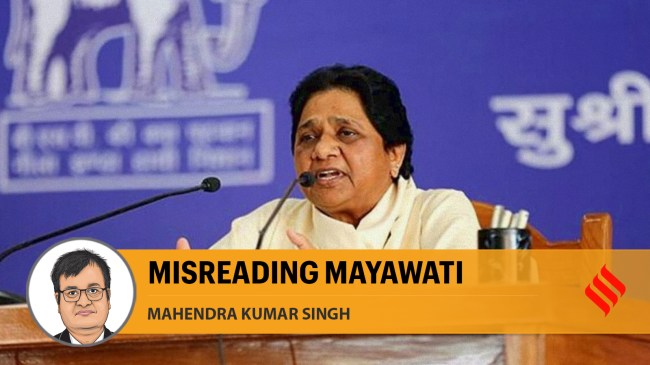Opinion Dear Editor, I Disagree: To say BSP is in permanent decline overlooks nature of Dalit mobilisation
While BSP may not be winning elections at the moment, its consistent vote share still makes it a critical force in UP politics
 The only real concern is Mayawati’s increasing political inactivity, which raises questions about her long-term strategy and commitment to the movement.
The only real concern is Mayawati’s increasing political inactivity, which raises questions about her long-term strategy and commitment to the movement.
By Mahendra Kumar Singh
I would like to disagree with several issues raised in the editorial, ‘The diminishing’ (March 4). The argument that the Bahujan Samaj Party (BSP) is in irreversible decline is an oversimplification of the nuanced political reality of the Hindi heartland. While the party has faced electoral setbacks recently, critics either misinterpret its strategy or fail to acknowledge the broader dynamics at play.
A frequently cited point is Mayawati’s decision to expel her nephew, Akash Anand. Critics, who interpret this as a sign of internal instability and a lack of succession planning, ignore Mayawati’s leadership style — her strict emphasis on discipline, loyalty and ideological purity. The expulsion seems to be an assertion of Mayawati’s preference for experienced and mature leadership over dynastic considerations. The message is clear: Unlike other parties, where family-based leadership transitions are taken for granted, in the BSP, leadership is determined by political acumen and ideological clarity.
The BSP’s vote share has indeed declined — from 30.46 per cent in the 2007 UP Assembly polls to 12.9 per cent in 2022 and 9.39 per cent in the 2024 Lok Sabha elections. However, interpreting this purely as an irreversible collapse misses historical trends in Dalit-Bahujan politics. The BSP has always experienced fluctuating fortunes, particularly in multi-party contests. Dalit political mobilisation has historically oscillated between periods of consolidation and fragmentation. Similar arguments about the BSP’s supposed decline were made in the early 1990s, only for the party to rise to power in 2007.
Moreover, while the BSP may not be winning elections at the moment, its consistent vote share still makes it a critical force in Uttar Pradesh politics. The ability to secure nearly 10 per cent of the vote without alliances or significant resources demonstrates that its core voter base remains intact.
The claim that the BSP has failed to engage with contemporary social justice discourse, particularly the caste census movement, is an oversimplification. Unlike the Samajwadi Party (SP) and Congress, which have recently embraced the caste census as a political tool, the BSP has long championed proportional representation for marginalised groups with slogans like “jiski jitni sankhya bhari, uski utni hissedari (representation in proportion to population)”.
Moreover, BSP hasn’t left its social engineering experiments, such as Bhaichara Sammelans. Rather, its shift from Bahujan to Sarvajan was an adaptation to changing caste dynamics. The suggestion that the BSP has failed to frame a fresh political narrative ignores its continued advocacy for Dalit representation in governance, the judiciary, and administration. The caste census data alone will not lead to empowerment unless it translates into concrete policy action.
Another oft-repeated claim is that the BJP’s subaltern Hindutva strategy has permanently eroded the BSP’s support. While it is true that the BJP has successfully mobilised non-Jatav Dalits and OBCs through welfare schemes and representation in government and party structures, it would be premature to assume that this support is permanent, as was evident in the 2024 Lok Sabha results in Uttar Pradesh.
Many marginalised groups still view the BJP’s social justice claims with skepticism, given the dominance of upper castes in its leadership. As concerns over constitutional amendments, the dilution of reservation, and privatisation grow, many Dalits and OBCs may find that the BSP remains the only party with a committed ideological framework to address their aspirations.
The rise of Chandrashekhar Azad Ravan is often framed as a threat to the BSP, but this assumes that Dalit political assertion must be a zero-sum game. In reality, Azad’s grassroots activism and the BSP’s institutional electoral politics serve different but complementary roles. While Azad mobilises mass movements, the BSP provides the political framework necessary for lasting Dalit empowerment.
The presumption that the BSP’s reluctance to forge alliances has weakened its prospects overlooks Mayawati’s past experiences with coalitions, where partnerships often resulted in a dilution of the BSP’s independent political identity. While alliances may offer short-term gains, they often subordinate Dalit interests to dominant caste groups. Following Kanshi Ram’s vision, it avoids alliances that do not guarantee genuine representation for Bahujans.
It is better to read the BSP’s current position as a phase of recalibration. Like before, it is well-positioned to make a comeback when political conditions shift. The only real concern is Mayawati’s increasing political inactivity, which raises questions about her long-term strategy and commitment to the movement.
The writer teaches Political Science at DDU Gorakhpur University





